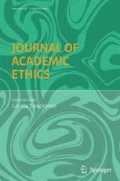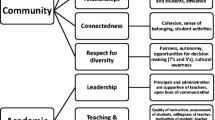Abstract
Establishing a reliable and valid measure of academic integrity that can be used in higher education institutions across the world is a challenging and ambitious task. However, solving this issue will likely have major ramifications for understanding dishonest action. It also enables the development of a standardised measure that can be used to assess the efficacy of interventions aimed at enhancing academic integrity that can be administered across regional boundaries and diverse cultural groups. This study has used a combination of confirmatory factor analysis and item distribution inspection procedures to further validate the cross-cultural academic integrity questionnaire version 2 (CCAIQ-2). Primary participants in this study were from Saudi Arabia (n = 338), and secondary reference participants were from New Zealand (n = 366). The findings indicate that a revised 10-item questionnaire, the cross-cultural academic integrity questionnaire version 3 (CCAIQ-3), has better credibility in terms of construct validity than its predecessor. Three CCAIQ-3 domains are proposed: copying, cheating, and complying. This research will inevitably create further academic and international debate; however this measure is likely to be useful in terms of creating a research protocol for evaluating and measuring cross-cultural issues and interventions aimed at promoting academic integrity.


Similar content being viewed by others
References
Abaraogu, U. O., Henning, M. A., Okpara, M. C., & Rajput, V. (2016). Disclosing academic dishonesty: Perspectives from Nigerian and New Zealand health professional students. Ethics and Behavior, 26(5), 431–447. https://doi.org/10.1080/10508422.2015.1055494.
Aggarwal, R., Bates, I., Davies, J. G., & Khan, I. (2002). A study of academic dishonesty among students at two pharmacy schools. The Pharmaceutical Journal, 269(7219), 529–533.
Almutairi, K. M. (2015). Culture and language differences as a barrier to provision of quality care by the health workforce in Saudi Arabia. Saudi Medical Journal, 36(4), 425.
Anastasi, A., & Urbina, S. (1997). Psychological testing (7th ed.). Upper Saddle River, NJ: Prentice Hall/Pearson Education.
Anderson, R. E., & Obenshain, S. S. (1994). Cheating by students: Findings, reflections, and remedies. Academic Medicine, 69(5), 323–332.
Arbuckle, J. L. (1995). Amos™ 18 User’s guide. Chicago: Amos Development Corporation.
Beaton, D. E., Bombardier, C., Guillemin, F., & Ferraz, M. B. J. S. (2000). Guidelines for the process of cross-cultural adaptation of self-report measures. Spine (Phila Pa 1976), 25(24), 3186–3191.
Billings, S. W., & Dages, K. D. (2018). Cross-cultural validity of integrity assessments for lower-level and higher-level jobs. International Journal of Selection and Assessment, 26(1), 66–74.
Byrne, B. M., & Campbell, T. L. (1999). Cross-cultural comparisons and the presumption of equivalent measurement and theoretical structure: A look beneath the surface. Journal of Cross-Cultural Psychology, 30(5), 555–574.
Central Intelligence Agency. (2018). The world factbook. https://www.cia.gov/library/publications/the-world-factbook/docs/profileguide.html.
Coverdale, J., & Henning, M. A. (2000). An analysis of cheating behaviours during training by medical students. Medical Teacher, 22(6), 582–586.
Garzón Umerenkova, A., de la Fuente Arias, J., Martínez-Vicente, J. M., Zapata Sevillano, L., Pichardo, M. C., & García-Berbén, A. B. (2017). Validation of the Spanish short self-regulation questionnaire (SSSRQ) through Rasch analysis. Frontiers in Psychology, 8, 276.
Granitz, N., & Loewy, D. (2007). Applying ethical theories: Interpreting and responding to student plagiarism. Journal of Business Ethics, 72(3), 293–306.
Harkness, J. A., Van de Vijver, F. J. R., & Johnson, T. P. (2003). Questionnaire design in comparative research. In J. A. Harkness, F. J. R. van de Vijver, & P. P. Mohler (Eds.), Cross-cultural survey methods (pp. 19–34). Hoboken, NJ: Wiley.
Harries, R., & Rutter, P. (2005). Cheating by pharmacy students: Perceptions, prevalence and comparisons. Pharmacy Education, 5(1), 53–60.
Henning, M. A. (2004). Reliability of the conflict resolution questionnaire: Considerations for using and developing internet-based questionnaires. The Internet and Higher Education, 7(3), 247–258. https://doi.org/10.1016/j.iheduc.2004.06.005.
Henning, M. A., Abaraogu, U. O., Ram, S., Malpas, P., & Hawken, S. J. (2016). Developing a cross-cultural academic integrity questionnaire for medical and health sciences students. Medical Science Educator, 26, 581–586. https://doi.org/10.1007/s40670-016-0302-3.
Henning, M. A., Nejadghanbar, H., & Abaraogu, U. (2018). Developing a revised cross-cultural academic integrity questionnaire (CCAIQ-2). Journal of Academic Ethics, 16(3), 241–255.
Henning, M. A., Ram, S., Malpas, P., Shulruf, B., Kelly, F., & Hawken, S. J. (2013). Academic dishonesty and ethical reasoning: Pharmacy and medical school students in New Zealand. Medical Teacher, 35(6), e1211–e1217.
Hinkin, T. R. (1995). A review of scale development practices in the study of organizations. Journal of Management, 21(5), 967–988.
Hofstede Insights. (2017). Compare countries. https://www.hofstede-insights.com/product/compare-countries/. Accessed 16 Oct 2018.
Howe, A., Crofts, D., & Billingham, K. (2000). Can nurses teach tomorrow s doctors? A nursing perspective on involvement in community-based medical education. Medical Teacher, 22(6), 576–584.
Hui, C. H., & Triandis, H. C. (1989). Effects of culture and response format on extreme response style. Journal of Cross-Cultural Psychology, 20(3), 296–309.
Kam, C. C. S., Hue, M. T., & Cheung, H. Y. (2018). Academic dishonesty among Hong Kong secondary school students: Application of theory of planned behaviour. Educational Psychology, 1–19.
Krägeloh, C. U., Wang, G. Y., Zhao, Q., Medvedev, O. N., Wu, Y., & Henning, M. A. (2018). Revised competitiveness index for use in China: Translation and Rasch analysis. International Journal of Educational Research, 90, 78–86. https://doi.org/10.1016/j.ijer.2018.05.008.
Lei, P. W., & Wu, Q. (2007). Introduction to structural equation modeling: Issues and practical considerations. Educational Measurement: Issues and Practice, 26(3), 33–43.
Lin, C.-H. S., & Wen, L.-Y. M. (2007). Academic dishonesty in higher education—A nationwide study in Taiwan. Higher Education, 54(1), 85–97.
Marsh, H. W., Balla, J. R., & McDonald, R. P. (1988). Goodness-of-fit indexes in confirmatory factor analysis: The effect of sample size. Psychological Bulletin, 103(3), 391.
Marshall, S. J., & Garry, M. (2005). How well do students really understand plagiarism? In ASCILITE 2005 conference, Brisbane, Australia. Retrieved from http://www.ascilite.org.au/conferences/brisbane05/blogs/proceedings/52_Marshall.pdf.
McCabe, D. L., Butterfield, K. D., & Trevino, L. K. (2006). Academic dishonesty in graduate business programs: Prevalence, causes, and proposed action. Academy of Management Learning & Education, 5(3), 294–305.
Mills, S. (2016). Cross-cultural measurement. https://www.apadivisions.org/division-5/publications/score/2016/04/culturally-fair-tests.aspx. Accessed 16 Oct 2018.
Morrison, T. G., Morrison, M. A., & McCutcheon, J. M. (2017). Best practice recommendations for using structural equation modelling in psychological research. Psychology, 8(09), 1326.
Muhney, K. A., Gutmann, M. E., Schneiderman, E., DeWald, J. P., McCann, A., & Campbell, P. R. (2008). The prevalence of academic dishonesty in Texas dental hygiene programs. Journal of Dental Education, 72(11), 1247–1260.
Obi, C. N., Leggett, C., & Harris, H. (2017). National culture, employee empowerment and advanced manufacturing technology utilisation: A study of Nigeria and New Zealand. Journal of Management & Organization, 1-23.
Rawwas, M. Y., Al-Khatib, J. A., & Vitell, S. J. (2004). Academic dishonesty: A cross-cultural comparison of US and Chinese marketing students. Journal of Marketing Education, 26(1), 89–100.
Razek, N. (2014). Academic integrity: A Saudi student perspective. Academy of Educational Leadership Journal, 18(1), 143–154.
Reid, S., & Bingham, T. (2017). Academic integrity for the multitudes: Reflections on a MOOC. The ANZTLA EJournal(15), 69-88.
Ryan, G., Bonanno, H., Krass, I., Scouller, K., & Smith, L. (2009). Undergraduate and postgraduate pharmacy students’ perceptions of plagiarism and academic honesty. American Journal of Pharmaceutical Education, 73(6).
Smith, T. W. (2003). Developing comparable questions in cross-national surveys. In J. A. Harkness, F. J. R. van de Vijver, & P. P. Mohler (Eds.), Cross-cultural survey methods (pp. 69–92). Hoboken, NJ: Wiley.
Trudgill, P., & Hannah, J. (2017). International English: A guide to varieties of English around the world. Abingdon: Routledge.
Author information
Authors and Affiliations
Corresponding author
Ethics declarations
Conflict of Interest
All authors declare that they have no conflict of interest.
Ethical Issues
None to be declared.
Informed Consent
Informed consent was obtained from all individual participants included in the study.
Additional information
Publisher’s Note
Springer Nature remains neutral with regard to jurisdictional claims in published maps and institutional affiliations.
Appendix
Appendix
Arabic version of the CCAIQ-3
ينطبق على تماماً | لا ينطبق على أبداً | ||||||
|---|---|---|---|---|---|---|---|
٦ | ٥ | ٤ | ٣ | ٢ | ١ | نسخ عمل لطالب آخر بإذنه | 1 |
٦ | ٥ | ٤ | ٣ | ٢ | ١ | تغيير كلمات لجزء من عمل آخر وتقديمها على أنها لي | 2 |
٦ | ٥ | ٤ | ٣ | ٢ | ١ | نسخ من طالب آخر أثناء الإمتحان دون ان يدرك ذلك | 3 |
٦ | ٥ | ٤ | ٣ | ٢ | ١ | إعادة تقديم عمل في مادة تم تقديمة مسبقاً لمادة أخرى | 4 |
٦ | ٥ | ٤ | ٣ | ٢ | ١ | شراء عمل لتقديمه لمهمة دراسية | 5 |
٦ | ٥ | ٤ | ٣ | ٢ | ١ | القيام بالإمتحان عن شخص آخر او جعل شخص آخر يقوم بالإمتحان بدلا عنك | 6 |
٦ | ٥ | ٤ | ٣ | ٢ | ١ | استخدام البراشيم في الإمتحانات التحريرية | 7 |
٦ | ٥ | ٤ | ٣ | ٢ | ١ | قص ولصق من الإنترنت مع الإستشهاد بها في المراجع | 8 |
٦ | ٥ | ٤ | ٣ | ٢ | ١ | الاقتباس من عمل سابق مع الإستشهاد بالمرجع | 9 |
٦ | ٥ | ٤ | ٣ | ٢ | ١ | كتابة عملك الدراسي عند الإنتهاء من البحث | 10 |
Rights and permissions
About this article
Cite this article
Henning, M., Alyami, M., Melyani, Z. et al. Development of the Cross-Cultural Academic Integrity Questionnaire - Version 3 (CCAIQ-3). J Acad Ethics 18, 35–53 (2020). https://doi.org/10.1007/s10805-019-09350-4
Published:
Issue Date:
DOI: https://doi.org/10.1007/s10805-019-09350-4




